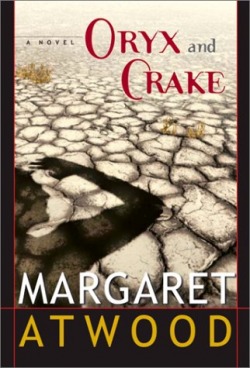In recent years, dystopic literature has made a resurgence in the world of reading. Two novels stand in the forefront of the movement, Atwood's Oryx and Crake and Cormac McCarthey's The Road. Both novels garnered much- due critical attention and were widely received in the mass market, largely due to renewed concerns about the outplaying of certain cultural and national behaviors and trends. Unfortunately, I feel like Oryx and Crake is one of Atwood's weaker novels; the complexity I so admire seemed tempered in this post-apocalyptic tale. But the novel is still worth discussion, and for many people, worth the read.
Margaret Atwood's cautionary tale weaves a story in which technology and scientific inquiry has run amuck. The world, as we now know it, no longer exists, and there is but one human being left to tell the tragic downfall of mankind. This human being, oddly named Snowman, must fend for himself amidst mutated and genetically altered creatures. No longer does one worry about cockroaches or feral cats, instead animals like pigoons populate the earth and frighten poor Snowman with their barbaric, human eating tendencies. These creatures were originally bred in order to house numerous organs for human transplants. The pigs possessed "balloon-like" middles in order to produce these human organs, and thus the name "pigoon" was born. But like almost all scientific advances in the novel, the pigoon experiment ends badly. The creatures ravage the earth and torment the few remaining inhabitants that were misfortune enough to survive.
The narrative shifts between Snowman's present struggle in this post apocalyptic world and the days of his childhood and youth when the world was on the brink of destruction.
In the past, Snowman, or Jimmy, as he was then called, interacts with a few key characters, Crake and Oryx. This triad of humanity makes the book bearable, without these characters and their early interactions, the novel would be a sad and fairly unconvincing depiction of self-inflected destruction.
Crake, a childhood friend with a penchant for geeky endeavors and seclusion, becomes an obvious player in the destruction of mankind. Atwood adequately foreshadows his role in the demise of humanity, and the reader traces tiny statements and actions to their final outplaying.
Oryx, a mysterious Asian woman, plays a sexual and emotional role in the lives of both Crake and Jimmy. She comes from an Asian country, where she was sold as a sex-slave, and while interesting, her character is never allowed to develop. She plays an important role in the life of Snowman, but the reader is unable to understand who she is, what she wants, and why she exists.
One of my problems with the novel is the lack of emotional development. These characters felt flat, and part of the reason I kept on reading the novel was to discover greater levels of emotional nuance. Unfortunately, the book ended before I found anything more to their existence than simple plot advancement.
As a reader, I prefer novels that invite me to dive into the depths of a character's soul or mind. I enjoy reading about the complexity of human relationship and the layers of human thought. This novel did not offer me much in that department. Not to say that Atwood's novel isn't entertaining...on the contrary, I read this novel in two days because I couldn't stop turning the pages. But when I reached the end of it, I felt disappointed. I wasn't able to connect with the characters, and thus the novel made only a slight impression on my mind.
If you enjoy dystopic literature, you will find reason to read this novel. Atwood makes some interesting points about the danger of certain scientific behaviors/trends. But if you're hoping to find a novel with a rich cast of characters, I would suggest one of Atwood's former works, such as the Blind Assassin or the Robber Bride.


 RSS Feed
RSS Feed
